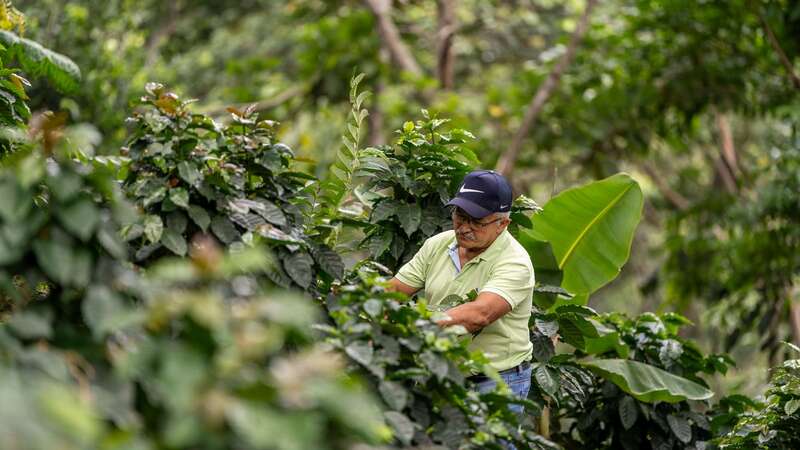
A variety of challenges including climate change is putting coffee production “in danger”, according to farmers in Colombia, which is a major exporter to the UK.
Soaring temperatures mean farmers have to grow their crops higher up and rainfall changes are making growing and picking more challenging. Climate change means their plants are increasingly vulnerable to rust, brown eye spot or borer insects, further hitting their yields.
The area has seen a 35% drop in coffee production in just five years - according to the Latin American and Caribbean Fairtrade Network (CLAC). Javier Ardila, a 44 year old farmer from Sierra Nevada, laments the change. He recalls needing a coat in the afternoon three decades ago but now the mercury hits 28C. That's a huge concern because Arabica coffee can only really cope with temps of up to 24C.
Mr Ardila said: "We are natives of the Sierra Nevada and we feel really sad because we know every day is getting worse." Another farmer, Jaime Garcia Florez, who lives in Siberia township, also expressed his fears. He agrees that farming coffee will be "very hard" because the weather is getting hotter and less predictable.
Mr Florez said: "We're in danger because of climate change. We used to think it was something existential and far away, but now we see it is really here."
 Queen honoured in London New Year's fireworks before turning into King Charles
Queen honoured in London New Year's fireworks before turning into King Charles
Farmers are struggling because their revenues have dropped dramatically. Last year, they got more than five dollars (£3.96) for every kilogram, but now it's only about three dollars (£2.38). It is becoming more expensive to grow coffer with some farmers unable to raise the money needed to start production.
They're trying to make money by growing other products like cocoa and honey. Mr Ardila warned: "Coffee could be destined to disappear. If the prices are not good, then we have to change to other crops. If after harvesting, you sell everything and you're still in the same place, it's very hard for you to continue in the business."
Another farmer Fernando Gutierrez, 48, said: "You feel like something is dying and you can't avoid it. You see something dying little by little. That's what we feel."
Jorge Marino, a 63-year-old farmer said: "If there is a day that we don't produce any more coffee, we will suffer in our spirits because that is what we know how to do, what we learned from our parents, our grandparents and it's our way of living. "I will be heartbroken if we can't do that anymore."
The Red Ecolsierra group is a group of farmers who work together to grow things in a sustainable way. They use money from Fairtrade to plant different trees with their crops. "Is it going to help us in the future? Maybe it won't help us enough but we are trying," said Mr Florez. "We are trying to do our job."
Red Ecolsierra is also making it easier for farmers to sell their coffee to people in other countries. The organisation now exports its own coffee directly, meaning it shortens the supply chain and retains more value for the farmers.
Fairtrade campaigners are calling on consumers and retailers to buy products that better support farmers and workers on the front lines of the climate crisis as it marks its 30th birthday on Monday. Since 1994, an estimated 10 million people across Latin America, Africa and Asia have benefited from Fairtrade terms with 6,000 products being sold in the UK alone.
Fairtrade Foundation chief executive Mike Gidney said: “Of course, there is still so much to be done. “Our world is perhaps more dangerous now than it was 30 years ago: the climate crisis, global insecurity, rising costs and long-term low pricing continue to threaten farmers’ futures. That matters to us all.”
Read more similar news:
Comments:
comments powered by Disqus

































